Neil Morrison | November 3, 2021
In a conversation with Cycle News at the recent Austin MotoGP, Kevin Schwantz assesses the current goings on in the MotoGP World Championship.
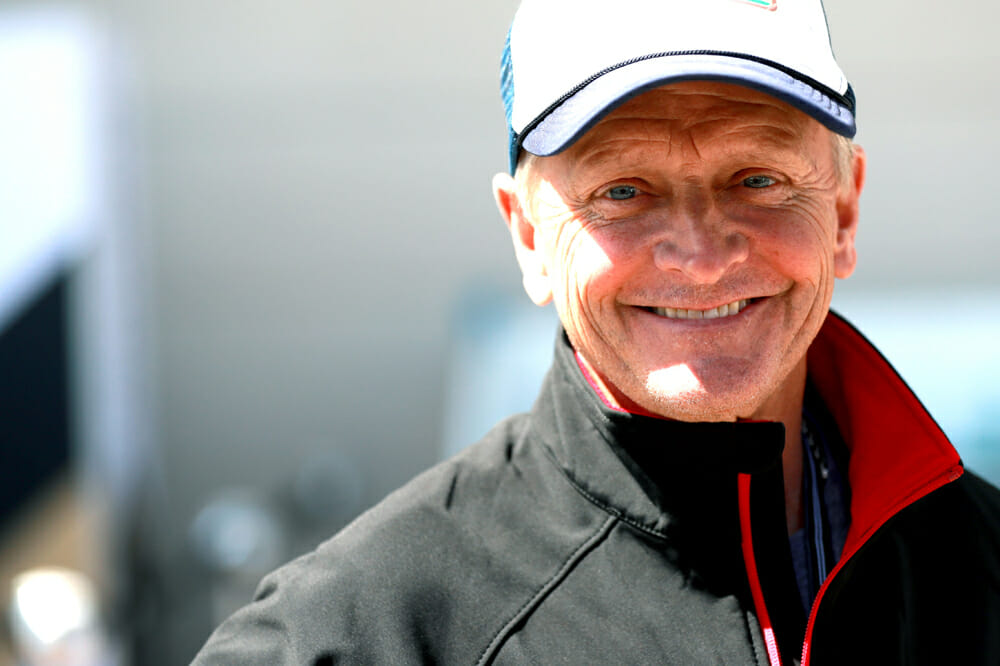 Kevin Schwantz has distanced himself from the MotoGP paddock of late but he’s still a very interested (and opinionated) onlooker.
Kevin Schwantz has distanced himself from the MotoGP paddock of late but he’s still a very interested (and opinionated) onlooker.
By Neil Morrison | Photography by Gold & Goose
After the global pandemic, American hero Kevin Schwantz admits he leads a mostly quiet life. “We worked a bit on the track here,” he told television cameras at the Grand Prix of the Americas. “But fishing, my dog, my girlfriend—that’s about it. Just enjoying life,” came his response when asked by pitlane reporter Simon Crafar how he currently passes his days.
One thing Schwantz neglected to add was watch racing. The 1993 500cc World Champion keeps a keen eye on MotoGP, the series he lit up over seven-and-a-half years that resulted in 25 victories against arguably the strongest field of riders that ever lined up on the same grid.
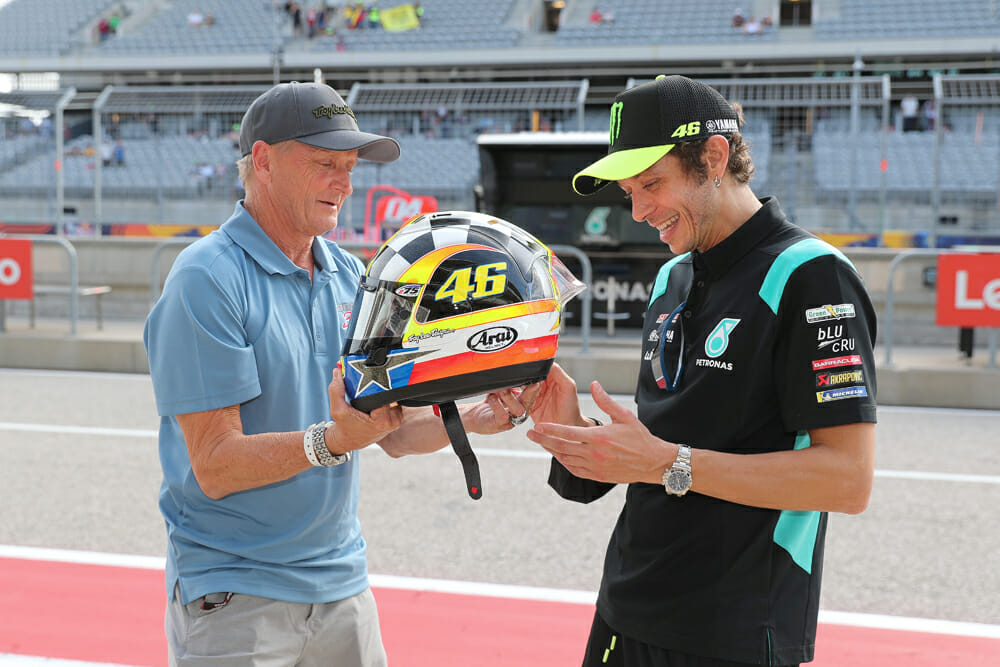 Schwantz presents a special 46 Arai Corsair-X to good friend Valentino Rossi. It’s probably the first Arai the lifetime AGV rider Rossi has ever had!
Schwantz presents a special 46 Arai Corsair-X to good friend Valentino Rossi. It’s probably the first Arai the lifetime AGV rider Rossi has ever had!
And even if the Texan has been retired for 26 years, he still has an eye for the details. Sitting down with Cycle News just after MotoGP qualifying had finished at the Circuit of the Americas, he could see what was incoming the following day. Marc Marquez had just finished Saturday in third place—his first front-row start of the year.
“Does he still have the speed to win here?” Schwantz asked rhetorically. “Absolutely.” Twenty-four hours later he was proved right.
But first, the Texan, now 57, gave his opinion on Fabio Quartararo, who was on the cusp of clinching his first MotoGP Championship. Back in his day, Schwantz regularly fronted up to the might of Honda and Yamaha even if the capabilities of his Suzuki RGV500 were some way off those of his rivals. Some of his most memorable victories—think of that epic four-way slug at Suzuka at the start of 1991 or the late-braking duel with Wayne Rainey at Hockenheim the same year—came when his bike wasn’t necessarily the fastest one.
And while Yamaha’s 2021 M1 is undoubtedly a fine motorcycle in the right hands, there has been something reminiscent of Schwantz in how Quartararo has single-handedly taken the fight to a hoard of Ducatis and, occasionally, Joan Mir’s Suzuki. An intelligent, mature ride to second place in Austin meant the Frenchman would all but be assured of the title at the time.
Would Quartararo be a deserving champion in Schwantz’s eyes?
“I think he’s earned it. I think he deserves it,” he said at the time. “In the first year he was fast and we were like, ‘Wow, that was amazing!’ Then last year he was like, boom, boom, boom at the start of the season, but then couldn’t finish in the points. I thought, ‘Wow, how did that happen?’ Then this year, that eighth place at Aragon has been one of his worst races all season.
 Fabio Quartararo is a deserving champion, says the Texan.
Fabio Quartararo is a deserving champion, says the Texan.
“It used to be you had to be top three every weekend. But this sport has gotten so competitive that I think if you can keep yourself within the top five, or occasionally, top 10 every weekend, and avoid those races where you DNF to a minimum, you’ll be in contention to win [the championship]. I think Fabio’s done a great job. I love the pressure Pecco’s applying right now. But I think it could be just too little, too late.”
Talk turns to the manufacturer Schwantz used to call home. Suzuki came into the 2021 season as defending champions for the first time in 20 years. And despite a host of spirited performances, Mir’s title defense came to an end in Texas with a muted eighth place. A lack of development has led to the GSX-RR to drop from the grid’s best bike to one that has struggled to keep up with the Ducatis and Quartararo’s Yamaha.
Yet maintaining that edge as a manufacturer is never easy, with Suzuki one of the lesser resourced factories on the grid. As Schwantz—one of only six men to have won a premier class crown with Suzuki—explained, the factory’s size must always be taken into account.
“[Joan] needs to realize he’s been there three years now. He’s had a decent bike [in 2019] and a great bike [in 2020]. Now he’s seeing what it’s like the rest of the time when it’s not one of those few [best bikes that Suzuki produces] every six, seven or eight years.
“It’s such a hard thing at Suzuki with the manufacturer being so much smaller, with the race shop being that much smaller, the development team being that much smaller. There are no satellite teams to help you with input, to give you data. It’s a really, really hard job. It’s so easy to get frustrated. But what you’ve got to remember is the guys at the shop are the guys that gave you the bike that you won on last year. They’re eventually going to get it right again. If you continue to race at the front and get close, they’ll eventually put something underneath you that will put you where you want to be.”
Does the former number-34 consider Mir, the current number-36, to be riding on the same level as the men ahead of him in the championship? “I don’t think he’s there right now,” Schwantz opined. “I think he’s working to get back to that championship-caliber guy that we had last season. There have been a couple of times Rins has got in front and ridden away from him. And more often than not Rins has ended up on the ground. [Joan] is there, 100 percent. I think maybe the bike’s not there 100 percent. And because [together] they’re both not 100 percent, he hasn’t got that extra Joan Mir in him that we saw some of the time last year late in the races, going to the front.”
 Joan Mir’s season hasn’t been one of his best, according to Schwantz. “I think he’s working to get back to that championship-caliber guy that we had last season.”
Joan Mir’s season hasn’t been one of his best, according to Schwantz. “I think he’s working to get back to that championship-caliber guy that we had last season.”
Another stand-out feature from his own career was Schwantz’s near miraculous recoveries from injury. He finished fourth in the 1992 Hungarian Grand Prix three weeks on from breaking his left arm and dislocating his left hip in that collision with Eddie Lawson at Assen. Two years later he cracked the scaphoid in his left wrist on the Thursday of the Dutch TT only to finish fifth 48 hours later. And the final of his 25 premier class wins was one of his finest: his 1994 British GP success came in spite of complications to that same wrist injury, as well as bruises suffered in a monumental qualifying highside crash. His fighting spirits brought at least one team member to tears that day.
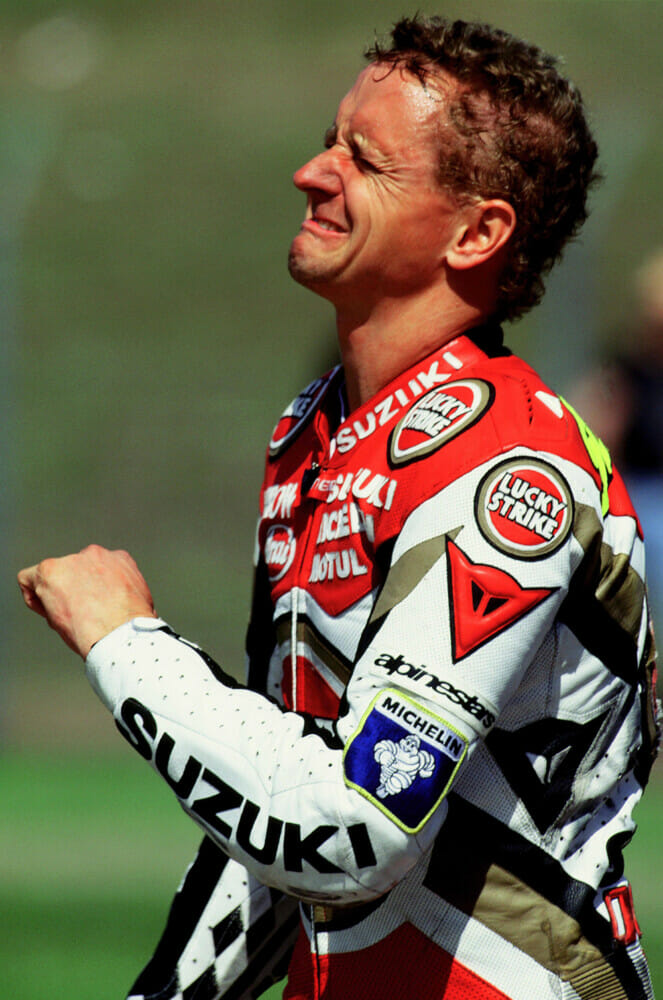 Schwantz’s ability to come back from injury was legendary. This broken wrist on Friday at Assen in 1994 saw him ride to fifth place on Sunday.
Schwantz’s ability to come back from injury was legendary. This broken wrist on Friday at Assen in 1994 saw him ride to fifth place on Sunday.
How has Schwantz assessed Marquez’s comeback from his career-threatening injury? “You know, with the exception of some of those big Friday crashes he had, I didn’t think he was being quite cautious enough,” Schwantz said. “You get back and you think you feel 100 percent. But you haven’t been on the bike, and you haven’t been racing at the front. You really try and push the envelope and it’s so easy for it to sneak up and bite you. I mean, not just some little lowsides; some real big, nasty crashes.
“Knock on wood, I’m glad he hasn’t re-injured himself. I think that’s been a bit of a punch in the gut for him and think, ‘I need to back off.’ I heard him say in the press conference the other day, which I was really impressed with, he said, ‘I need to get back here 100 percent [points to shoulder], I need to get back here 100 percent [points to head], but then I need to find that extra special thing I had before I got hurt. Being 100 and 100 isn’t enough. You’ve got to be better than that to be at the front of this class.’ That made a lot of sense.”
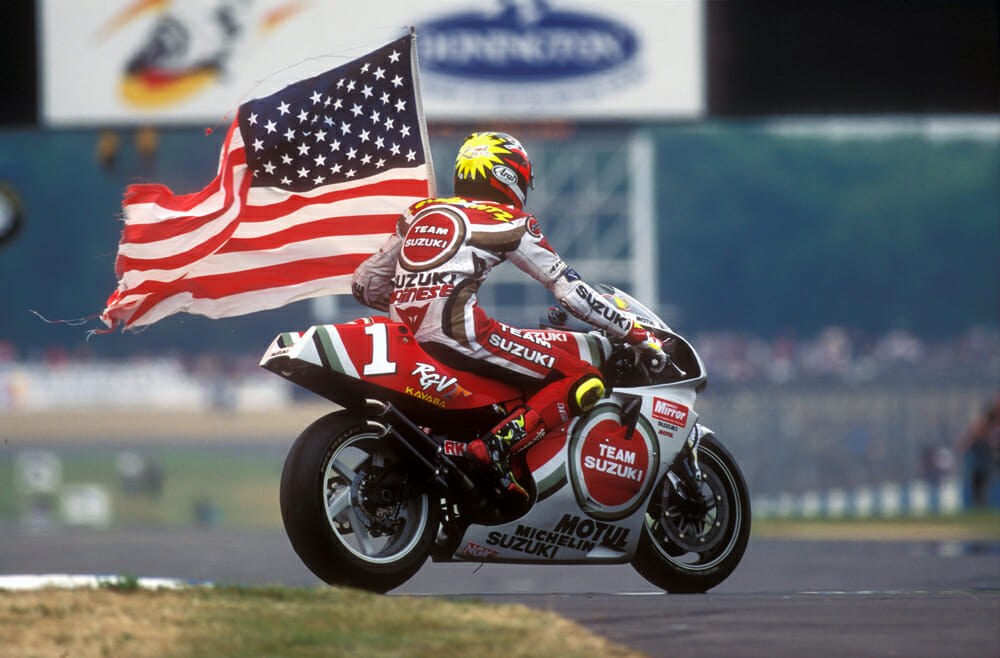 Schwantz’s final 500cc race win at Donington Park in 1994 came after another monumental highside in practice.
Schwantz’s final 500cc race win at Donington Park in 1994 came after another monumental highside in practice.
So how do you do it as a racer, coming back from something so jarring? “You’ve got to remember you’re not at 100 percent,” Schwantz said. “If I got a wrist that’s just on the mend, I’ve got to not be as aggressive on the brakes. I have to be more subtle, get my body in position earlier and use the back of the tank to keep the pressure off [my wrist], and I’ve got to realize in the center of the corner, if it starts to push then I’m probably not going to be able to react. So, I need to make sure I do everything perfect. I work even harder to get the bike set up.
“I used to try and come back as quick as I could because I knew two weeks off, my mind had lost that functionality at 180 mph. I needed to get my head back there even if I needed to get back, physically. I felt like a race weekend or two off, my train of thought was, ‘If I was off with an injury for two or three weeks, it was at least that length of time, if not double, to get back to where I was when I hurt myself.
“With Marquez being off for a full season, he’s made an incredible comeback. A lot of people say he’s still struggling physically and say, ‘I can tell he’s not at 100 percent.’ Well, I can’t tell that. But it’s that extra little bit he talked about in the press conference that he’s still missing. That’s just going to come with time and confidence.
“I really thought when he did what he did at the Sachsenring that the entire paddock was in trouble. [It looked like] he was getting ready to just punch them out one after one after one. Bagnaia and him in Aragon, then Bagnaia and Quartararo in Misano were just off in the distance, and he should have been able to catch them but couldn’t do anything with it. It’s kind of settled in. He seemed like a different person in the press conference on Thursday [in Austin] to me.”
 Marquez is more tempered, according to Schwantz, who firmly believes the number-93 will come back and win consistently again.
Marquez is more tempered, according to Schwantz, who firmly believes the number-93 will come back and win consistently again.
Schwantz certainly knows talent when he sees it. A revelation of the recent Americas Grand Prix was the regard which he holds for current Moto3 title leader Pedro Acosta. The Circuit of the Americas was a chance for the Texan to meet the 17-year-old rookie for the first time, whereupon Acosta revealed his father—Pedro Senior—was a huge fan of the number-34.
And the Texan was certainly impressed by the way Acosta carries himself. “How about this quote from Pedro: I’d much rather have champagne than gravel. And he says, ‘I don’t really like what’s in the middle! I don’t like anything except the champagne…’
“I mean, oh my gosh! He’s just a kid where you walk in the garage, and he pukes confidence. He was like, ‘Oh hey! Nice to meet you, my dad used to call me Kevin! My name was Pedro, but I raced the number 34.’ What a great kid. Well spoken. Just seems to love what he’s doing. I think he’s got a brilliant future in the sport for sure, and probably a Moto3 championship under his belt this year.”
 “He’s just a kid where you walk in the garage and he pukes confidence.” Schwantz is a big fan of Moto3 rider, Pedro Acosta.
“He’s just a kid where you walk in the garage and he pukes confidence.” Schwantz is a big fan of Moto3 rider, Pedro Acosta.
Moving to the end of our conversation, talk turns to where MotoGP is at. Come the end of November, the paddock will find itself in a position unique to the last 22 years: Valentino Rossi will not be among the names on track when preseason officially commences. There was a time when this would have spelled disaster for the sport. But Schwantz, one of Rossi’s childhood heroes, believes that MotoGP is well now equipped to deal with his absence.
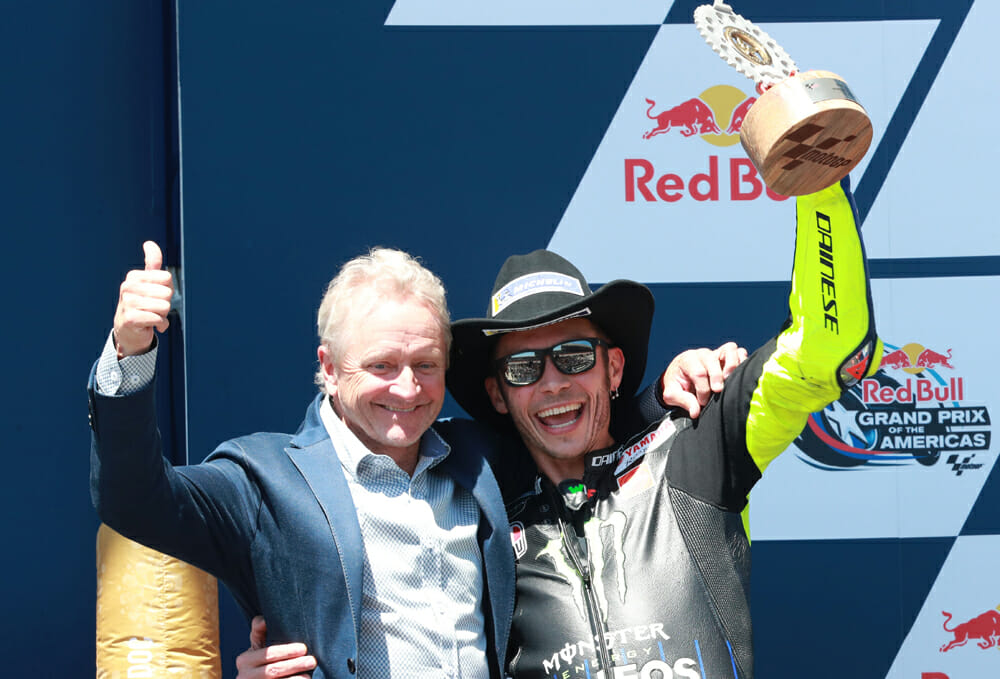 Rossi and Schwantz on the Austin podium in 2019. The Texan knows Rossi’s impact on the sport will last for many years to come.
Rossi and Schwantz on the Austin podium in 2019. The Texan knows Rossi’s impact on the sport will last for many years to come.
“I’ve said this several times now: the impact he’s had on the sport, we’re still going to feel through the teams and the riders he runs through the Academy,” Schwantz said. “He’s not going to be out there racing number 46 in yellow on Sunday. But his guys are going to be out there—Pecco [Bagnaia], [Luca] Marini, all those guys will still be in the championship and flying the ‘46’ colors. I can’t imagine that Valentino is not going to be there to enjoy their spoils of victory.” CN
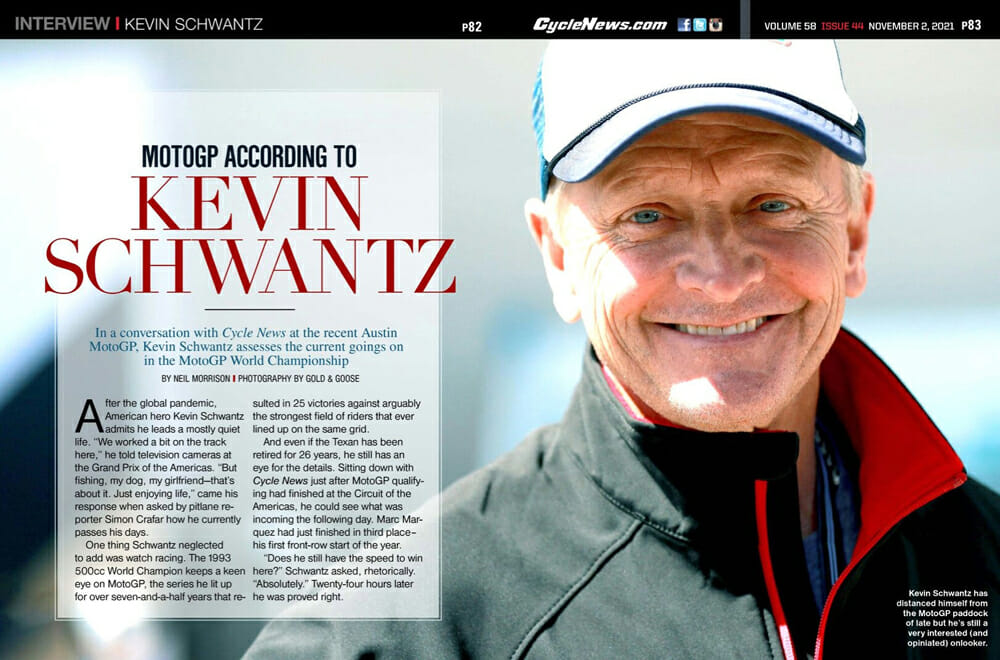
Click here to read the Kevin Schwantz Interview in the Cycle News Digital Edition Magazine.
Click here for all the latest MotoGP news.